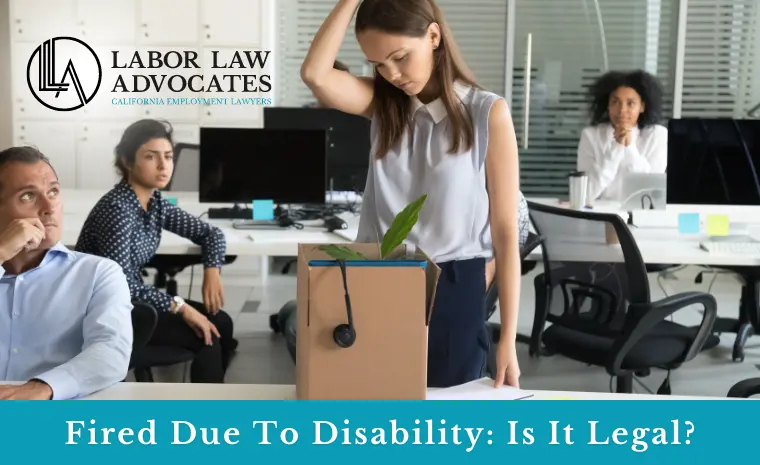Fired Due To Disability: Is It Legal?
Being fired due to a disability is a deeply painful and unjust experience that strikes at the very core of a person’s identity and self-worth. The weight of discrimination and vulnerability can be overwhelming, as individuals with disabilities often face the harsh reality of prejudice and misunderstanding in the workplace.
The hard road to overcoming this issue is undeniably arduous, but it begins with recognizing your legal rights and knowing that you are not alone. Armed with knowledge about disability laws, accommodations, and support systems, you can find the strength to fight back!
In this blog, we will provide all the information you need to understand your employment rights, how to advocate for them, and obtain the work treatment you deserve as a qualified employee. Remember, you are not defined by your disability, but by your resilience and determination to overcome adversity!
Has your employer discriminated against you?
Understanding the Disability
The Americans with Disabilities Act (ADA) defines disability as a legal term, not a medical one. It refers to a person who experiences physical or mental impairment that significantly impairs one or more major life activities. This definition is different from other civil rights laws, such as those dealing with Social Security Disability benefits.
This definition also includes individuals with a history of such an impairment, even if they are not currently disabled. The ADA prohibits discrimination against individuals based on their association with a person with a disability.
Discrimination: Disability and Dismissal
Even today, there still are discrimination issues that occur in the workplace. One of the most unfair and illegal practices is disability discrimination, which can take various forms, such as unequal treatment, harassment, denial of reasonable accommodations, or wrongful termination.
Despite legal protections and efforts to promote inclusivity, people with disabilities continue to face unfair treatment and wrongful dismissal.
Let’s take a look at a case involving McDonald’s, where a disabled person faced discrimination due to his cerebral palsy.
Alia Corporation | McDonald’s Discrimination
This case study focuses on the legal proceedings initiated by the Los Angeles District Office against Alia Corporation, the company that owned and managed the McDonald’s restaurant in question. The employee filed a complaint with the U.S. Equal Employment Opportunity Commission (EEOC), alleging that he was mistreated because of his disability.
The employee, who had cerebral palsy, had been working happily under the previous owner of McDonald’s. He was a dedicated worker and even got promoted from a crew member to a floor supervisor. However, things took a turn for the worse when Alia Corporation took over the restaurant. The new management treated the employee differently because of his disability, and he was suddenly demoted from his supervisory role to a janitorial position. This was a huge blow to his self-esteem and job status.
On top of the demotion, the company also significantly cut his work hours, almost in half. This meant a substantial reduction in his income. As if that wasn’t enough, they even paid him less for his work. The poor treatment and the drastic changes in his job left the employee with no other choice but to resign from McDonald’s. The combination of discrimination, demotion, reduced hours, and lower wages made it impossible for him to continue working there.
The EEOC filed a case against Alia Corporation. The allegation is that they violated the ADA. According to the wrongful termination ADA, employers must provide reasonable accommodations for disabled employees. Alia Corporation should have done so. Instead, they discriminated against the employee.

Fired Due To Disability: Is It Legal?
Getting fired solely based on a disability is illegal. The ADA prohibits employers with 15 or more employees from discriminating against qualified individuals with disabilities. This means that employers cannot terminate an employee based on their disability or medical conditions.
The ADA requires employers to provide reasonable accommodations to qualified individuals with disabilities, allowing them to perform essential job functions. If an employee is unable to perform certain job duties due to their disability, employers must engage in an interactive process to determine if reasonable accommodations can be made to enable the employee to continue working. If this is not possible, the employer must consider whether there are other suitable positions within the company that the employee can be transferred to.
In cases of illegal termination due to disability, workers with disabilities have the right to file a legal claim with the EEOC and seek legal help from an experienced employment lawyer.
How To Prove Wrongful Termination Due to Disability
Proving wrongful termination due to disability can be a challenging task, as it requires gathering sufficient evidence and presenting a strong case. To start, consult an experienced attorney that can help gather all relevant documentation, such as medical records, doctor’s notes, examination, and any correspondence related to the disability. This evidence will help establish a clear connection between the disability and the termination.
Additionally, it is crucial to demonstrate that the employer was aware of the disability and failed to provide reasonable accommodations as required by law. Experienced employment law attorneys can help you understand the process of securing proof and collect witness testimonies from colleagues or supervisors who can attest to the discriminatory treatment. Having legal advice from an experienced employment lawyer specializing in disability discrimination can provide valuable guidance on proving wrongful termination.
Facing wrongful termination?
Damages from Wrongful Termination Due to Disability
In case of illegal termination due to disability, employees can recover different types of damages. Some potential damages you may be entitled to include:
- Back Pay: Including the wages and benefits you would have earned from the date of the termination.
- Reinstatement or Job Offer: In certain situations, the court may order your restatement to the same or similar position within the company.
- Front Pay: If reinstatement to your previous position is not possible or feasible, you may be entitled to receive compensation for future lost wages and benefits.
- Compensatory Damages: Any emotional distress, pain, suffering, mental anguish, or any other non-economic harm caused by the wrongful termination.
- Punitive Damages: In some cases, punitive damages may be awarded to punish the employer for the discrimination and negligent conduct and to deter similar actions in the future.
If you believe you have been wrongfully terminated due to your disability, you need to consult Labor Law Advocates in California. We can provide guidance on the specific damages you can recover and help you navigate the complex legal process.
Fired Due To Disability: Frequently Asked Questions
Here are some frequently asked questions relevant to wrongful termination and disabilitys in California.
Can an employer fire an employee for excessive absences related to their disability?
Employers must be careful when dealing with disability-related absences. If the absences are covered by the ADA or similar laws, the employer should engage in an interactive process to determine if reasonable accommodations can be made to address the attendance issues. Terminating an employee solely because of disability-related absences may violate the law.
Can I file a lawsuit if I was wrongfully terminated due to my disability?
Yes, if you believe you were wrongfully terminated due to your disability, you may have grounds to file a discrimination lawsuit. Consult with an attorney familiar with employment law and disability rights.
What laws in California protect employees from disability discrimination?
In California, employees with disabilities are protected under the California Fair Employment and Housing Act (FEHA). FEHA prohibits discrimination based on disability, among other protected characteristics, and requires employers to provide reasonable accommodations to disabled employees.
Stay Strong! We Are Your Legal Support.
If you’ve experienced wrongful termination due to your disability in California, you don’t have to face it alone. Labor Law Advocates is here to stand strong by your side, advocating your rights and seeking justice.
With a team of experienced attorneys in California’s disability and labor laws, we are committed to providing the support and legal expertise you need during this challenging time.
Together, we can make a difference in a workplace that respects and protects the rights of all employees! Call us now for a free consultation – Available 24/7.




